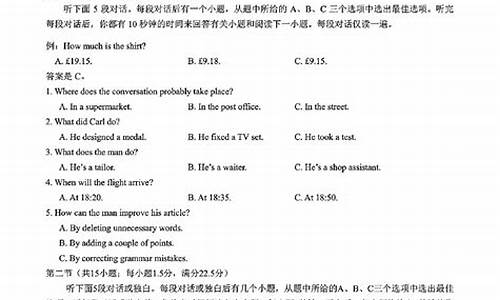您现在的位置是: 首页 > 招生信息 招生信息
2016高考听力原文全国卷2,2016高考听力原文
tamoadmin 2024-05-21 人已围观
简介2007年北京高考英语听力原文第一节Text 1W: Where are you from?M: I’m from Atlanta, but I live in New York now.W: I live in Washington D.C.Text 2W: OK, John. How much do you pay for electricity and telephone services?

2007年北京高考英语听力原文
第一节
Text 1
W: Where are you from?
M: I’m from Atlanta, but I live in New York now.
W: I live in Washington D.C.
Text 2
W: OK, John. How much do you pay for electricity and telephone services?
M: My electricity bill is about 50 dollars a month, and my telephone bill is usually 24 dollars a month.
W: How much do you pay for transportation?
M: 30 dollars a month.
Text 3
W: Do you happen to know what’s on after the news?
M: I think it’s the Animal World. Do you mind if we watch it?
W: Mmm… can we watch the movie on Channel 6 instead?
Text 4
M: Hello.
W: Hello. I’m calling about the apartment you advertised in the newspaper.
M: Two-bedroom or three-bedroom?
W: No, the advertisement says one-bedroom, one bath.
M: Oh, sorry. That’s not available now.
Text 5
W: Excuse me.
M: Yes?
W: I need something for drawing a straight line.
M: Oh, you want a ruler. There’s one on my desk. I’ll get it for you.
第二节
Text 6
M: Mary, I am here!
W: Oh, hi! I’m sorry I’m so late. The car wouldn’t start, so I had to come by bus.
M: Oh, no. What do you think is the matter with your car?
W: Well, it wouldn’t start at all. I mean, I turned the key and nothing happened. So I guess it’s something to do with the electrical system.
M: Well, let’s forget about that now, and order our food. What would you like? The fish is good.
Text 7
M: Right, where shall we go now? We’ve seen the church and the modern art exhibition. I don’t know what else there is here.
W: How about some shops? I could buy something to take back for the kids.
M: Mmm… yes. OK. Let’s go down here and we’ll go into the main street.
W: You know, it’s really good of you to spend so much time showing me around.
M: Oh, that’s all right. I’m enjoying it, actually. You know how it is. When you live in a town, you never really look at it yourself. Come on, let’s go down here.
Text 8
W: Do you have a moment, Mark?
M: Yeah, sure, Susan.
W: I know this is short notice, but I wonder if you’d be able to fly out and give a speech about our project this weekend.
M: But I thought you were going to do that.
W: Well, yes. I was. But I’m terribly busy at the moment.
M: This weekend? Couldn’t John go? He knows all about the project.
W: Yeah, but he doesn’t know the people, and he doesn’t know the city. Mark, I think you’re the right person for the job.
M: I get the message.
W: Thanks, Mark.
M: Yeah.
Text 9
W: Hi, Tony!
M: Hello, Kate! How are you?
W: Oh, fine, thanks. And you and Jane?
M: Oh, we’re fine. How long are you staying?
W: Just a couple of days. And then I’ll be back to work in Tokyo.
M: What a pity you are not staying in London for a bit longer. Anyway, how about dinner tonight?
W: I’d love to, but I’m seeing some customers from Oxford this evening. What about tomorrow?
M: That’d be lovely. Jane will be pleased.
W: What time shall I come?
M: How about eight?
W: Great. I’ll see you tomorrow then.
Text 10
W: Oh, Frank’s in your class? He was in my class last term. I didn’t like him at all.
M: What? You didn’t like Frank? He’s one of my best students.
W: Oh, no. Not Frank! He was always asking questions. Frank always interrupted me and the other students. He was never quiet.
M: Yes, that’s Frank. That’s why he is such a good student. He is always thinking and trying to use English. He laughs a lot. Frank doesn’t worry about making mistakes. I enjoy having him in class.
W: Not me. I love students like David. Do you have him in your conversation class this term?
M: Yes, but to be honest, David is too quiet for me. I can’t tell if he’s learning. David is so silent. He doesn’t say anything.
W: Yes, that’s David. That’s how good students should be. They have to listen to their teachers.
Text 11
M: When I tell people that I paint the Golden Gate Bridge, they think I start at one end, paint to the other end, and then start again. But that’s not true. We are always painting the bridge. But we have to go where paint is in bad condition. It’s a dangerous job. You have to be careful all the time. You can’t work or appear without safety equipment. And the weather, it gets colder up here. Sometimes it’s so cold there’s ice on the bridge. You have to wear warm clothes. Sometimes it’s windy and foggy. On foggy days, you can’t see anything. Other times, you are both the fog. The view from the top is the thing that I love about the job. On a sunny day like today, you can see from the ocean to the port and all the way to the mountains.
1.W: Hello, may I help you?
M: Yes, we would like to check into our room.
2.W: Come on, John! Relax! What can go wrong?
M: At my first job interview? Plenty
3.M: Good morning, madam, what can I do for you?
W: Well, someone at the hotel suggested I come here to buy a coat.
4.W: I gave Dave 300 dollars for his sponsored concert.
M: 300 dollars? Sandy, you must be mad! I wish I had 300 dollars to throw round like that.
5.M: Shall I come and take you to the railway station?
W: No, thanks, I’ll manage. It’s not far any way.
6. W: How many children have you got?
M: Two. John’s five and Clair’s four. And there’s another one on the way.
7. W: Do you know how I can stop drinking too much coffee?
M: No, but I wish I did. I spend too much money at cafe’s.
8. W: Could you give me a hand moving this cupboard, please?
M: Well, I’d rather not if you don’t mind. I’m not feeling well today.
9. M: Tom’ s house is a mess! Doesn’t he ever clean it?
W: I guess he just has too much ails on his mind with that new job
10.M: I didn’t have any trouble in finding accommodation in Britain.
W: According to my experience, it sounds too good to be true.
passage 1:
Well, I own a small data processing company, in which I employ about eight to ten workers. And the point I want to make has to do with trust. I know it’s possible to force people to be 100% efficient. But I think when you do that, you lose confidence and trust. I let my employees use our equipment and make personal phone calls. They are more than welcome to decide what is right and wrong. Because I think you can’t run a company by just giving orders to robots and watching them like big brother, right? I think you have to trust people and give them a little freedom. And also, as far as phone calls and all that go, I want my people to call home and check on their children and know their children are safe and sound. As a result, I have devoted employees who are willing to go that extra mile and I can honestly say they show up to work smiling. So I get more satisfaction and rewards by trusting my employees than by suspecting them of doing something wrong.
Passage 2
Questions14-16 are based on the following passage:
The roots of Canadian English can be found in the events which followed the American revolution of 1776. Those who had supported Britain found themselves unable to stay in the new United States, and most went to Canada. They were soon followed by many thousands who were attracted by the cheapness of land. Within 50 years, the population of upper Canada had reached 100 thousand, mainly people from the United States. In the east, the Atlantic provinces had been settled by English speakers as early as the 15th century, but even today, these areas contain less than ten per cent of the population, so that they have only a limited role in the development of Canadian English. In Quebec, the majority of people use French as a mother tone. Here English and French exist together but uneasily. Because of its origins, Canadian English has a great deal in common with the rest of the English spoken in North America, and is often difficult to distinguish for people who live outside the region. To British people, Canadians may sound American; to Americans, they may sound British. Canadians themselves insist on not being identified with either, and certainly, there is a great deal of evidence in support of this view.
section C
Directions: in Section C, you will hear two longer conversations. The conversations will be read twice. After you hear each conversation, you are required to fill in the numbered blanks with the information you have heard. Write your answers on your answer sheet.
Blanks 17-20 are based on the following conversation:
A: Good morning, Leeds University students registration center.
B: Good morning, I need to register for a class.
A: OK. May I take your name, please?
B: Sure, it’s Andrew Smith.
A: Which department do you study with?
B: The history department.
A: May I have your student ID?
B: HD3309.
A: What class are you trying to take?
B: I want to take a photography class.
A: Well, there’re only two classes open.
B: Can you tell me what days the classes are on?
A: One is on Tuesday, from 2 pm. to 4 pm.
B: And the other?
A: From 10:00 to 12:00 on Thursday.
B: OK, sign me up for the class on Tuesday.
A: Very well, then.
Complete the form. Write one word for each answer.
Blanks 21-24 are based on the following conversation:
A: Welcome to our program, Anny. Please tell our audience the best things about the experiment in international living.
B: Well, my group was great! And I love my host family.
A: Can you tell us about your group?
B: Well, we were all high school students from the US. But we were very different.
A: You mean from different cities, with different religions and cultures?
B: Yes, and I was existed about that. We learnt that we weren’t really so different.
A: What do you mean?
B: Well, we became such good friends. More than friends, we were like a family.
A: Wonderful. I’d like to know more about your host family.
B: Oh, I loved my host family in Costa Rica. They were my family, too. I felt like I was their daughter.
A: So nice! Did you have any problems speaking with them?
B: No, not really. Actually, I learnt a lot of Spanish from them. And I also learnt that language is not always so important.
A: What do you mean?
B: Well, in some cases, a simple smile can say more than words.
A: Thanks so much, Anny.
Complete the form. Write no more than 3 words for each answer.









